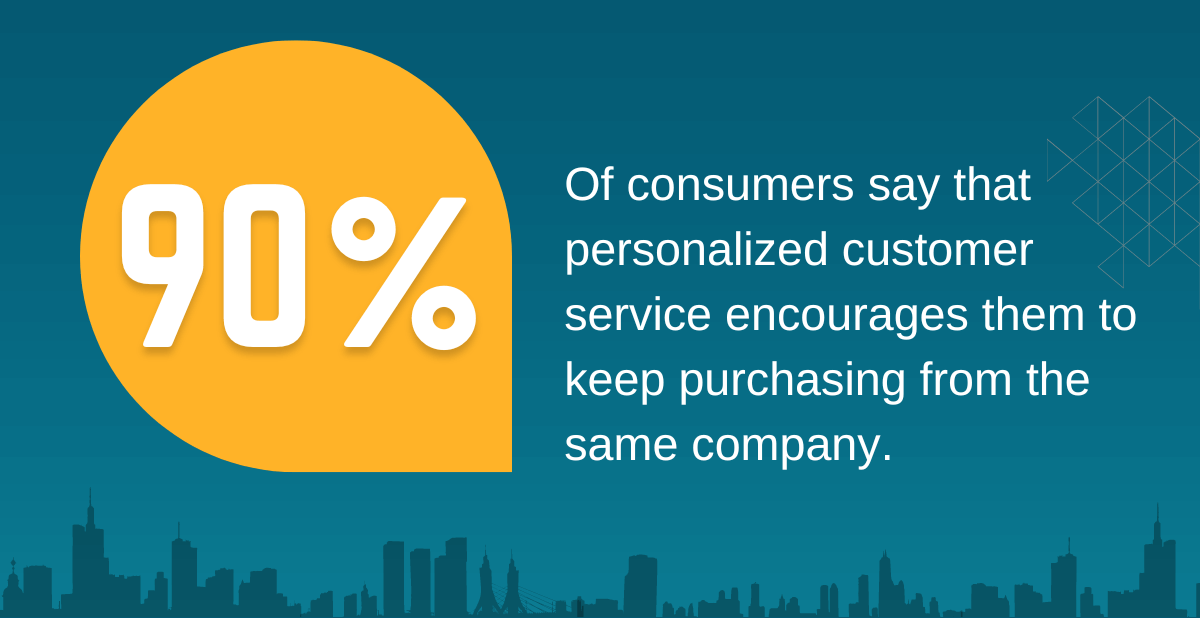Table of Contents
Learn through this article how businesses rely on agents in contact and call centers to boost customer satisfaction and brand loyalty. We’ll also tackle the importance of using contact centers as a service (CCaaS) to achieve that goal.
How Support Agents Help Retain Loyal Customers

Contact and call centers handle massive numbers of inquiries. These can be from customers with problems or questions about their purchases. Call centers, in particular, manage inbound and outbound voice transactions. Meanwhile, contact centers manage consumer interactions across multiple channels, including phone calls, chat, email, and social media.
Setting up in-house contact and call centers requires considerable funding to cover labor and infrastructure expenses. Because customer service is a non-revenue-generating task, it doesn’t ensure returns on investment (ROI). But it does help attract and retain consumers, especially when businesses hire the best CSRs and use advanced solutions.
Companies turn to third-party service providers to reduce operating costs. These providers deliver an unmatched customer experience. To efficiently address repetitive consumer inquiries, they employ skilled agents who undergo rigorous training to provide personalized support and handle complicated customer scenarios.
Contractors also deploy CCaaS platforms that integrate multiple communication channels. These cloud-based systems assist their agents in streamlining customer service delivery. The solution also automates responses to duplicate inquiries and simplifies task distribution for complex customer issues.
Combining human capital and technology enables companies to have cost-effective consumer support hubs. At the same time, they prioritize core capabilities. Discover below how agents gain customer trust and loyalty with CCaaS.
1. Answer Inquiries
Contact and call center agents are crucial in shaping the customer experience, a fact emphasized in Salesforce’s “State of the Connected Customer” report. It highlights that 80% of customers consider a company’s experience to be just as important as its goods or services.
In today’s fast-paced environment, customer service agents must quickly and effectively handle a wide range of inquiries, from product features and technical issues to service feedback and complaints.
The report also points out that 78% of customers expect companies to be adaptive to their changing needs, underscoring the importance of agents being well-informed and responsive.
With such high expectations, the ability of customer service representatives to offer knowledgeable and prompt responses, facilitated by CCaaS platforms, is essential to meeting customer demands and ensuring satisfaction. These agents address concerns and improve the customer experience to build brand loyalty and trust.
2. Provide Practical Solutions
In addition to answering inquiries, the second vital role of CSRs is to give practical solutions to customer problems. They should provide the right solutions for basic and complex issues consumers encounter. These measures must be doable and directly resolve buyer concerns.
For instance, a consumer receives a defective smartphone and voices their frustration with a CSR through a call. The agent must calmly talk to such a customer and explain options to address the issue. These options can include product returns, reimbursements, and replacements.
However, agents in contact and call centers might encounter repetitive inquiries, preventing them from focusing on what matters most. Dealing with duplicate concerns consumes too much time and adds to their daily burdens. Therefore, service providers offer CCaaS as well as their well-trained employees.
CCaaS’ artificial intelligence (AI) feature enables providers to offer fast solutions to frequently occurring customer issues. It also helps customers facing complex issues receive the best support by automatically matching them with suitable agents.
3. Promote Products and Services
Agents in contact and call centers also help promote company products and services. They understand customers’ varied preferences because they communicate directly with them. They know how to provide personalized promotional activities while conducting customer support.
Many businesses combine customer service and marketing teams to reach target consumers faster. Excellent customer support is part of a marketing strategy that attracts buyers and develops brand loyalty. Such businesses make their customer service teams an effective marketing tool by conducting the following steps:
- Familiarize CSRs with company products and services through training
- Use CCaaS platforms to streamline promotional campaigns
- Create joint omnichannel customer service and marketing strategies
- Establish a loyal consumer community using live engagement tools
- Collect, analyze, and use insights on consumers’ ad preferences
4. Communicate Effectively
Keeping customers happy is every company’s priority for long-term stability and growth. Consumers easily get frustrated, especially when they can’t receive appropriate responses and solutions to their problems. Consequently, they lose interest in the brand and switch to other companies.
Effective communication is crucial to ensuring customer satisfaction and retention. Contact and call center agents carry out positive customer interactions as part of their roles and responsibilities. They must have such communication skills to provide an outstanding customer service experience as:
- Clarity and conciseness. Relay straightforward messages using English and other required languages.
- Active listening. Pay attention to and understand what customers say to properly provide solutions and guidelines.
- Adaptability. Maintain mental flexibility to address various customer concerns via multiple communication channels.
- Empathy. Understand customers’ emotions and viewpoints to accommodate their different needs and preferences.
- Politeness. Use respectful words to avoid offending customers. Be polite even if the customer voices a great deal of frustration.
- Patience. Stay calm when dealing with rude and impatient consumers. Patience is the key to exceptional customer service.
5. Personalize Customer Engagement
In the evolving landscape of customer service, personalizing engagement is essential for nurturing customer loyalty. Twilio’s “State of Personalization Report 2023” underscores this, revealing that 92% of businesses have adopted AI-driven personalization strategies, acknowledging its significant impact on customer satisfaction and business growth.
However, a trust gap remains, as only 51% of consumers feel confident about brands handling their personal data. This dichotomy presents a unique challenge for contact center agents, who must skillfully balance personalization with data privacy. CRM allows agents to access customer histories and personalize interactions, fostering a sense of individual care.
This approach goes beyond business; it is about building genuine relationships and understanding each customer’s needs and preferences. Agents improve customer satisfaction and build trust and loyalty to encourage repeat business and positive word-of-mouth.

6. Collect and Analyze Buyer Feedback
Consumer reviews and ratings help businesses establish a good reputation in the market. Five-star ratings and positive feedback from customers reflect a company’s superb products. The scores also mean buyers have experienced good customer service after facing purchase problems.
In addition to accepting inquiries and giving solutions, agents collect and analyze customer comments. They use outbound and non-voice channels to survey customers about their recent support experiences. They usually work with marketing teams to help improve and promote company offerings.
Because such tasks involve massive datasets, CSRs use CCaaS platforms to automate collection and analysis. This capability allows them to work on other assignments while monitoring the latest trends and changes in customer preferences. It also accelerates insight creation and reporting needed to avoid product development and enhancement delays.
7. Accelerate 24/7 Support
Consumers seek agents who empathize with them regarding a flopped transaction or purchase. Buyers often choose simple and immediate resolutions rather than having long and warm-hearted conversations. In short, they value customer service teams capable of delivering quick assistance. They see such teams as respectful of their time.
With the help of CCaaS, customer service employees grant customers’ wishes for accelerated support. The technology enables automatic callbacks and replies to millions of repetitive customer requests. It prevents consumers from losing their patience due to long wait times and delayed resolutions.
But chatbots, interactive voice response (IVR) systems, and other self-service options don’t always provide appropriate solutions to customer queries. CSRs thus need to intervene to address complex problems. The cloud-based platform aids them in completing their tasks quickly.
8. Respond to Consumer Reviews
Many buyers depend on other people’s opinions when making their purchase decisions. In addition to scanning product features, they also look for comprehensive reviews from previous buyers. These reviews ensure they are getting the best item online. After all, nobody wants to spend money on the wrong purchase.
Agents respond to consumers whenever they leave feedback about products and services. They show companies’ active presence in dealing with consumer concerns, especially when receiving negative comments. They also relay how businesses appreciate positive comments and strive to improve their offerings.
Deploying CCaaS platforms streamlines agents’ responses to consumer reviews. The cloud solution’s omnichannel and automation features help them provide unified and quick replies to customer feedback. Such efforts help businesses protect their brand reputation while meeting consumer needs.
9. Support Content Development
CSRs are uniquely positioned to contribute to content development due to their daily interactions with customers and deep knowledge of company’s products and services. Their insights into customer demands and preferences are invaluable in advancing business offerings.
As per the Freshdesk Customer Service Benchmark Report 2023, leveraging self-service portals and canned responses for repetitive, low-effort queries is recommended, indicating a growing trend towards self-service in customer support.
Working alongside marketing teams, CSRs can use their understanding of consumer needs to aid in the creation of various types of strategic content, including:
- Knowledge base articles
- Frequently Asked Questions (FAQs)
- Help manuals
- How-to guides
- Troubleshooting documentation
- Blog posts
- Marketing copy
- Digital or printed posters and brochures
- Video tutorials
These self-service materials are increasingly important as customers often prefer to find solutions independently for issues with their purchases. The emphasis on self-service in the Freshdesk report reflects a significant shift in customer service trends, where providing effective self-service options is now a key component of delivering an excellent customer experience.
10. Monitor Customer Service Metrics
Businesses monitor their market reputation using key performance indicators (KPIs). These KPIs provide them with measurable targets to constantly improve their offerings, strategies, and decision-making efforts. They use the following indicators to track their customer service progress.
- Average wait time refers to how long customers wait for agents in contact and call centers to respond.
- Average resolution time means how long it takes for CSRs to provide solutions to consumers facing product issues.
- Customer churn indicates when buyers stop dealing with a company for different reasons, such as a terrible customer support experience.
- Customer satisfaction score measures clients’ happiness and satisfaction rates over a short period of engaging with CSRs.
- Net promoter score shows consumers’ likelihood of recommending a company and its offerings to their families, friends, or colleagues.
Support teams usually perform this function because they gather and examine confidential consumer data. They record, organize and report KPIs based on routine customer engagement datasets. Using CCaaS tools helps agents ease this time-consuming work.
Understanding KPIs informs businesses on what areas need improvement. The resulting insights guide them in developing new strategies to meet customer needs. These advantages help strengthen their loyal consumer base.
The Bottom Line

Damaged products and problematic services make customers impatient and frustrated. They may become even angrier when they can’t get quick responses and appropriate solutions to their problems. If left unaddressed, these gaps weaken customer trust and loyalty.
Support agents in contact and call centers are vital in ensuring customer satisfaction and retention. They achieve that goal by providing personalized and accelerated customer service, helping promote company offerings, and providing market insights. CCaaS platforms help them accomplish these repetitive tasks fast and efficiently.
Are you looking for a support team to maintain your loyal customer base? Don’t hesitate to contact and schedule a meeting with Unity Communications. The Inc. 5000 company uses advanced contact center software tools and employs skilled agents to help satisfy and retain your customers.




